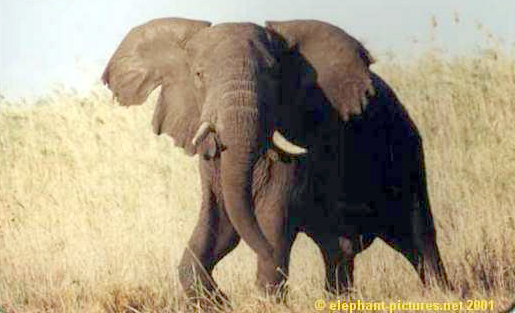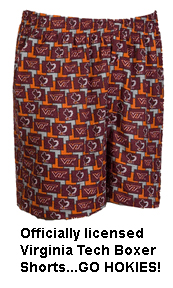The "Jockey Shorts Effect"
 Elephants
are one of the very few exceptions to the rule that mammals have extra-abdominal testes;
so are whales and perhaps other marine mammals. Presumably the optimum temperature
for spermatogenesis in elephants is the same as core body temperature.
Elephants
are one of the very few exceptions to the rule that mammals have extra-abdominal testes;
so are whales and perhaps other marine mammals. Presumably the optimum temperature
for spermatogenesis in elephants is the same as core body temperature.
I'm unaware of any other land
mammals that normally have intra-abdominal testes, but some seasonal breeders (such as small rodents) have testes that retreat into the body cavity in the non-breeding season, and "descend," becoming extra-abdominal when the time is appropriate. This is the case in squirrels, and some other species. The descent into the functional position is cued
by environmental factors, such as light, and mediated via hormonal signals.
 I can think of a number of advantages that intra-abdominal testes would be better in a whale: streamlining the body for optimum swimming efficiency would be one reason, but surely an even better one is the ghastly prospect of having barnacles
grow on an exposed scrotum. He'd have to scrape them off against a rock, an action that would certainly be fraught with danger.
I can think of a number of advantages that intra-abdominal testes would be better in a whale: streamlining the body for optimum swimming efficiency would be one reason, but surely an even better one is the ghastly prospect of having barnacles
grow on an exposed scrotum. He'd have to scrape them off against a rock, an action that would certainly be fraught with danger.
 There is anecdotal evidence that men who wear boxer shorts may father more
children than those who wear briefs. The alleged lowered fertility of briefs-wearers
is termed the "Jockey Shorts Effect." The cause is thought to be a
decreased rate of spermatogenesis when the testes are held too tightly against
the body by briefs. They're "too close to the fire," so to speak, and the temperature
rises above optimum. In recent years this idea has come into some disrepute,
and it's not one of those issues that burns to be settled. The chances of someone
landing a big NIH grant for A Long-Term Clinical And Epidemiological Study of the Relative
Fertility of Wearers of Boxers versus Briefs is slim, but perhaps MTV might be interested in funding it. It's probable that the Jockey Shorts
Effect is just another Urban Legend, but only good science can prove or disprove it.
There is anecdotal evidence that men who wear boxer shorts may father more
children than those who wear briefs. The alleged lowered fertility of briefs-wearers
is termed the "Jockey Shorts Effect." The cause is thought to be a
decreased rate of spermatogenesis when the testes are held too tightly against
the body by briefs. They're "too close to the fire," so to speak, and the temperature
rises above optimum. In recent years this idea has come into some disrepute,
and it's not one of those issues that burns to be settled. The chances of someone
landing a big NIH grant for A Long-Term Clinical And Epidemiological Study of the Relative
Fertility of Wearers of Boxers versus Briefs is slim, but perhaps MTV might be interested in funding it. It's probable that the Jockey Shorts
Effect is just another Urban Legend, but only good science can prove or disprove it.
Close This Window
 Elephants
are one of the very few exceptions to the rule that mammals have extra-abdominal testes;
so are whales and perhaps other marine mammals. Presumably the optimum temperature
for spermatogenesis in elephants is the same as core body temperature.
Elephants
are one of the very few exceptions to the rule that mammals have extra-abdominal testes;
so are whales and perhaps other marine mammals. Presumably the optimum temperature
for spermatogenesis in elephants is the same as core body temperature. I can think of a number of advantages that intra-abdominal testes would be better in a whale: streamlining the body for optimum swimming efficiency would be one reason, but surely an even better one is the ghastly prospect of having barnacles
grow on an exposed scrotum. He'd have to scrape them off against a rock, an action that would certainly be fraught with danger.
I can think of a number of advantages that intra-abdominal testes would be better in a whale: streamlining the body for optimum swimming efficiency would be one reason, but surely an even better one is the ghastly prospect of having barnacles
grow on an exposed scrotum. He'd have to scrape them off against a rock, an action that would certainly be fraught with danger. There is anecdotal evidence that men who wear boxer shorts may father more
children than those who wear briefs. The alleged lowered fertility of briefs-wearers
is termed the "Jockey Shorts Effect." The cause is thought to be a
decreased rate of spermatogenesis when the testes are held too tightly against
the body by briefs. They're "too close to the fire," so to speak, and the temperature
rises above optimum. In recent years this idea has come into some disrepute,
and it's not one of those issues that burns to be settled. The chances of someone
landing a big NIH grant for A Long-Term Clinical And Epidemiological Study of the Relative
Fertility of Wearers of Boxers versus Briefs is slim, but perhaps MTV might be interested in funding it. It's probable that the Jockey Shorts
Effect is just another Urban Legend, but only good science can prove or disprove it.
There is anecdotal evidence that men who wear boxer shorts may father more
children than those who wear briefs. The alleged lowered fertility of briefs-wearers
is termed the "Jockey Shorts Effect." The cause is thought to be a
decreased rate of spermatogenesis when the testes are held too tightly against
the body by briefs. They're "too close to the fire," so to speak, and the temperature
rises above optimum. In recent years this idea has come into some disrepute,
and it's not one of those issues that burns to be settled. The chances of someone
landing a big NIH grant for A Long-Term Clinical And Epidemiological Study of the Relative
Fertility of Wearers of Boxers versus Briefs is slim, but perhaps MTV might be interested in funding it. It's probable that the Jockey Shorts
Effect is just another Urban Legend, but only good science can prove or disprove it.